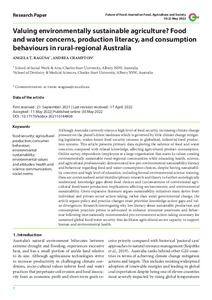| dc.date.accessioned | 2022-06-14T12:27:38Z | |
| dc.date.available | 2022-06-14T12:27:38Z | |
| dc.date.issued | 2022-05-30 | |
| dc.identifier | doi:10.17170/kobra-202110144908 | |
| dc.identifier.uri | http://hdl.handle.net/123456789/13923 | |
| dc.language.iso | eng | eng |
| dc.rights | Namensnennung 4.0 International | * |
| dc.rights.uri | http://creativecommons.org/licenses/by/4.0/ | * |
| dc.subject | food security | eng |
| dc.subject | agricultural production | eng |
| dc.subject | consumer behaviour | eng |
| dc.subject | environmental sustainability | eng |
| dc.subject | environmental values and attitudes | eng |
| dc.subject | health and science communication | eng |
| dc.subject | social norms | eng |
| dc.subject.ddc | 300 | |
| dc.subject.ddc | 630 | |
| dc.title | Valuing environmentally sustainable agriculture? Food and water concerns, production literacy, and consumption behaviours in rural-regional Australia | eng |
| dc.type | Aufsatz | |
| dcterms.abstract | Although Australia currently enjoys high food security, increasing climate change pressure on the planet’s direst land mass, governed by the least climate change mitigating legislators, makes this position increasingly tenuous amid increasingly globalised, industrial food production systems. This article presents primary data exploring the salience of food and water concerns compared with related knowledge affecting agricultural product consumption. Respondents to an online survey were drawn from employees at a large organisation responsible for training the ‘next generation’ of health, science communication and agricultural professionals, informed by mission statement values of creating environmentally sustainable rural-regional communities and practices. Despite organisational values, findings demonstrate low environmental sustainability literacy and behaviours regarding food and water consumption choices, even amongst those having self-identified concerns and higher educational degrees, including formal environmental science training. Data are contextualised amid interdisciplinary research and theory, furthering national/global understanding of knowledge gaps about food choices and (un)awareness about conventional agricultural food/water production implications for socioeconomic and environmental sustainability. Discussion of agricultural products limited featuring amongst environmental issue awareness (as an expansive literature argues sustainability change must derive from individual and relevant private sector change/knowledge acquisition) frames required next steps for policy and practice changes to address existing knowledge/action gaps and values. Research interrogating why low sustainable production/consumption literacy exists, for the purpose of active remedying, is advocated to enable consumer awareness/behaviours aligned with internationally recommended pro-environment action necessary for sustained global food/water security and facilitated agricultural sector capacity to support human and environmental health | eng |
| dcterms.accessRights | open access | |
| dcterms.creator | Ragusa, Angela T. | |
| dcterms.creator | Crampton, Andrea | |
| dc.subject.swd | Australien | ger |
| dc.subject.swd | Ernährungssicherung | ger |
| dc.subject.swd | Agrarproduktion | ger |
| dc.subject.swd | Verbraucherverhalten | ger |
| dc.subject.swd | Umweltverträglichkeit | ger |
| dc.subject.swd | Nachhaltigkeit | ger |
| dc.subject.swd | Wert | ger |
| dc.subject.swd | Natürliche Ressourcen | ger |
| dc.subject.swd | Verbrauch | ger |
| dc.subject.swd | Soziale Norm | ger |
| dc.type.version | publishedVersion | |
| dcterms.source.identifier | eissn:2197-411X | |
| dcterms.source.issue | No. 2 | |
| dcterms.source.journal | Future of Food: Journal on Food, Agriculture & Society | eng |
| dcterms.source.volume | Vol. 10 | |
| kup.iskup | false | |
| dcterms.source.articlenumber | 526 | |


